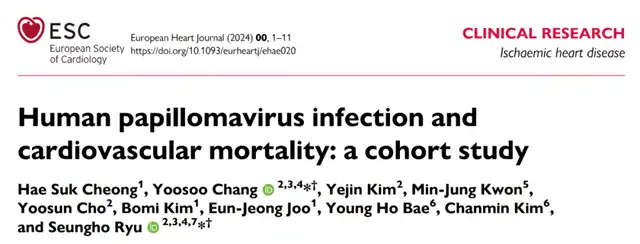HPV Increases Cardiovascular Mortality Risk: Especially in Obese Women
- Normal Liver Cells Found to Promote Cancer Metastasis to the Liver
- Nearly 80% Complete Remission: Breakthrough in ADC Anti-Tumor Treatment
- Vaccination Against Common Diseases May Prevent Dementia!
- New Alzheimer’s Disease (AD) Diagnosis and Staging Criteria
- Breakthrough in Alzheimer’s Disease: New Nasal Spray Halts Cognitive Decline by Targeting Toxic Protein
- Can the Tap Water at the Paris Olympics be Drunk Directly?
HPV Increases Cardiovascular Mortality Risk: Especially in Obese Women
- Should China be held legally responsible for the US’s $18 trillion COVID losses?
- CT Radiation Exposure Linked to Blood Cancer in Children and Adolescents
- FDA has mandated a top-level black box warning for all marketed CAR-T therapies
- Can people with high blood pressure eat peanuts?
- What is the difference between dopamine and dobutamine?
- How long can the patient live after heart stent surgery?
HPV Increases Cardiovascular Mortality Risk: Especially in Obese Women
Women infected with HPV have a significantly increased risk of dying from cardiovascular diseases, particularly among obese individuals.
Cardiovascular diseases (CVD) stand as a leading cause of global mortality, with an estimated 17.9 million deaths attributed to it in 2019 (32% of total global deaths), a number expected to rise to 23.6 million by 2030.
Despite considerable progress in managing traditional CVD risk factors such as smoking, abnormal lipid levels, hypertension, and diabetes, CVD remains a primary cause of death and disability.
Yet, these traditional risk factors alone cannot entirely account for the high incidence and prevalence of CVD, with approximately 20% of CVD cases lacking these traditional risk factors. Hence, identifying modifiable non-traditional CVD risk factors is crucial for devising optimal prevention and treatment strategies.
Human papillomavirus (HPV) is a sexually transmitted infection with a prevalence ranging from 2% to 44% in the general female population.
Infection with high-risk HPV (HR-HPV, including types 16, 18, 6, 11, etc.) is a known causative factor for cancers such as cervical cancer in women.
Studies have suggested a potential association between high-risk HPV and cardiovascular diseases. However, there have been no cohort studies assessing long-term cardiovascular outcomes associated with high-risk HPV infection.
Understanding the contribution of high-risk HPV infection to long-term cardiovascular consequences holds significant clinical relevance, especially considering the availability of HPV vaccines.
On February 7, 2024, researchers from Sungkyunkwan University in South Korea published a study titled “Human papillomavirus infection and cardiovascular mortality: a cohort study” in the European Heart Journal.
This large-scale cohort study conducted among women who underwent screening for high-risk HPV revealed a substantially increased risk of dying from cardiovascular diseases among those infected with high-risk HPV, with this correlation being particularly pronounced among obese women.

In this study, 163,250 young and middle-aged South Korean women without pre-existing cardiovascular diseases (with an average age of 40.2 years) underwent screening for high-risk HPV and were followed up for a median duration of 17 years (median follow-up of 8.6 years). National death records identified cases of cardiovascular disease-related deaths, and Cox proportional hazard regression analysis was used to estimate the hazard ratios (HRs) and 95% confidence intervals for cardiovascular disease mortality.
Analysis results revealed a total of 134 cases of cardiovascular disease-related deaths during the follow-up period. Among women not infected with high-risk HPV, the risk of cardiovascular disease-related death was 9.1 per 10,000 person-years, whereas among those infected with high-risk HPV, it was 14.9 per 10,000 person-years. After adjusting for traditional cardiovascular disease risk factors and confounding factors, compared to women not infected with high-risk HPV, those infected had hazard ratios of 3.91 for atherosclerotic cardiovascular disease (ASCVD), 3.74 for ischemic heart disease (IHD), and 5.86 for stroke.
The study further found that the association between high-risk HPV infection and ASCVD mortality was stronger in obese women compared to non-obese women. Specifically, in obese women with a BMI ≥ 25, the risk of ASCVD mortality among those infected with high-risk HPV was 4.81 times higher compared to those not infected, whereas in non-obese women with a BMI < 25, this figure was 2.86.
Overall, in this cohort study involving young and middle-aged women, those infected with high-risk HPV had higher cardiovascular disease mortality rates among women at lower risk, with this trend being more pronounced in obese populations.
The research team noted that inflammation plays a crucial role in the development of cardiovascular diseases, and viral infections serve as potential triggers for inflammation. While HPV is renowned for its association with cervical cancer, emerging research suggests its presence in the bloodstream. This may be due to the virus causing inflammation in blood vessels, leading to arterial blockage and damage, thereby increasing the risk of cardiovascular diseases. The study underscores the importance of comprehensive care for individuals infected with high-risk HPV. Clinicians should monitor the cardiovascular health of high-risk HPV patients, especially those with obesity or other risk factors. Individuals infected with high-risk HPV should be aware of their potential risks for heart disease and cervical cancer, undergo regular health screenings, and adopt healthy lifestyles to mitigate the risk of cardiovascular diseases.
[Paper Link: https://doi.org/10.1093/eurheartj/ehae020]
HPV Increases Cardiovascular Mortality Risk: Especially in Obese Women
(source:internet, reference only)
Disclaimer of medicaltrend.org
Important Note: The information provided is for informational purposes only and should not be considered as medical advice.



